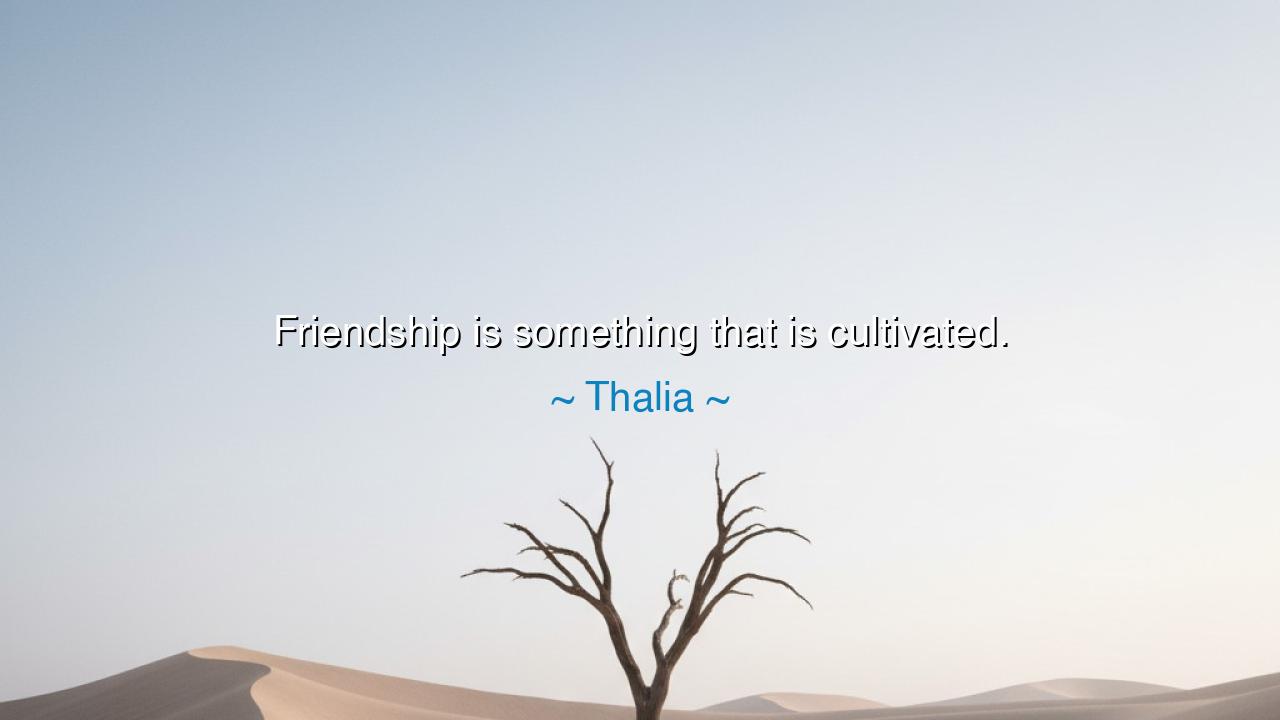
Friendship is something that is cultivated.






"Friendship is something that is cultivated." These words, spoken by Thalia, echo a profound truth about the nature of true friendship—it is not a fleeting bond formed by chance, but a deliberate and ongoing process. Just as the farmer tends to his field, sowing the seeds, nurturing the soil, and patiently waiting for the fruits to grow, so too must we tend to the friendships in our lives. Friendship, in this sense, is not something that happens spontaneously or without effort; it is a bond that grows over time, nurtured by care, attention, and the willingness to invest in one another. This cultivation requires both individuals to engage in the delicate dance of trust, understanding, and mutual respect.
In the ancient world, friendship was seen as one of the highest of human virtues. Aristotle spoke of friendship as a central pillar of the good life, arguing that true friendships were based on a shared pursuit of virtue. He believed that to cultivate such a friendship was to engage in an act of moral growth, a mutual cultivation that allowed both individuals to flourish. It was not simply about companionship, but about helping each other become the best versions of themselves. In this light, friendship was viewed as a reciprocal relationship, a partnership where both participants continually nourished the other, lifting each other higher through shared values and experiences.
Consider the friendship between Socrates and his disciples, especially Plato. Their relationship was not forged through immediate attraction, nor was it born of necessity alone, but through the constant exchange of ideas. Plato, a young and eager student, came to Socrates not merely to hear teachings but to engage in the cultivation of his own character. Socrates, in turn, shaped the minds of those around him, encouraging his companions to seek wisdom, question their assumptions, and challenge their own limitations. The bond between Socrates and Plato was not passive; it was active, requiring constant intellectual and emotional investment. They cultivated each other’s minds, shaping their futures in the process. Through this ongoing exchange, they exemplified the true nature of friendship as something that grows, deepens, and strengthens over time.
In the same way, friendship today requires more than a mere passing moment of connection. It requires the cultivation of shared experiences, values, and struggles. Friendship, like a garden, will not thrive unless we tend to it with patience and care. Trust must be built slowly, through repeated acts of kindness and vulnerability. Like seeds planted in the soil, the acts of listening, supporting, and showing up in times of need are the water and sunlight that nourish the roots of the relationship. But, as with any cultivated relationship, there are challenges. Just as a garden faces drought or pests, so too do friendships face periods of distance, misunderstanding, or conflict. Yet, it is precisely in these moments of difficulty that true friendship is either forged or lost. How we face these challenges together—the way we work through them and the care we show for one another—determines whether the bond strengthens or withers.
There is a beautiful example in the relationship between David and Jonathan from the Bible. Their friendship, often cited as one of the most profound and selfless, was not born of convenience. It was a bond that required sacrifice, loyalty, and, above all, the willingness to nurture the relationship, even when life presented them with great adversity. Jonathan, the son of King Saul, and David, the future king, were bound together not by shared power or wealth but by a deep, mutual commitment to one another’s well-being. When Saul, driven by jealousy, sought to kill David, Jonathan risked his life to warn him, showing the deep loyalty that defined their friendship. Their bond, rooted in trust and sacrifice, endured despite the challenges, and their story reminds us that friendship requires not just affection, but an active choice to stand by one another, no matter the cost.
So, what can we take from this ancient wisdom? The lesson is clear: friendship is not a passive experience; it is an ongoing process of cultivation. We must actively choose to invest in those around us, to nurture the relationships that matter most. To cultivate friendship is to continuously engage in acts of love, loyalty, and understanding. Like a garden, it requires both care and patience—and sometimes, we must be willing to weather the storms that come. But the reward is worth it. For in friendship, we find not only companionship but the opportunity to grow, to learn, and to become the best version of ourselves through the support and encouragement of those who walk beside us.
In our own lives, let us seek to cultivate the relationships that bring meaning and richness to our existence. Invest in the bonds that matter—be present, listen deeply, and act with integrity and care. Know that, just as a garden grows and flourishes with time, so too can our friendships, if we nurture them with the same love and attention. Let us be like the great philosophers of old, who understood that the truest friendships are those that are cultivated with patience, wisdom, and a deep commitment to one another’s growth. May we tend to the gardens of our relationships, and in doing so, build bonds that stand the test of time.






AAdministratorAdministrator
Welcome, honored guests. Please leave a comment, we will respond soon